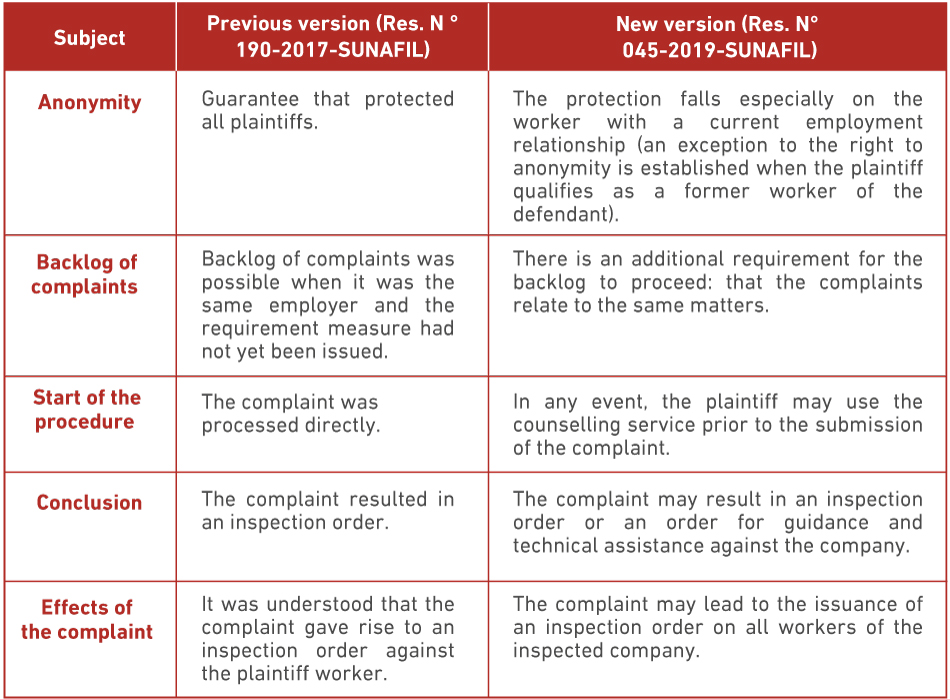New directive version on the labor complaints service is approved.- Through Superintendency Resolution No. 045-2019-SUNAFIL, published on January 26, the Resolution approving Directive No. 003-2017-SUNAFIL/INII (Directive regulating the issuance of the worker’s termination certificate) is canceled and the second version of Directive No. 002-2017-SUNAFIL/INII, called “Labor Complaint Service” is approved.
We summarize the main modifications made to the directive on the labor complaints service, as follows:
There is a time limit for communicating minimum services in the event of a strike. – Through Supreme Decree No. 001-2019-TR, published on January 29, 2019, it is established that companies have until February 28, 2019 to communicate the minimum services that should be covered in the event of a strike to their workers and to the Labor Administrative Authority.
Non-working days were declared in the public sector for 2019. – Through Supreme Decree No. 002-2019-PCM, published on January 4 2019, non-working days were declared in the public sector at the national level on July 30, August 29 and October 31 2019. In this regard, the following should be noted:
– These days shall be considered as working days for tax purposes.
– The hours stopped working must be compensated within ten (10) days immediately after the non-working days, or at the time established by the owner of each public entity.
– The public sector must take necessary measures to ensure the provision of essential services.
– The private sector may also grant non-working days, with the prior agreement between the employer and the workers who shall determine the manner in which the recovery of hours stopped working will be effected. In the absence of an agreement, the employer shall decide.
– Companies carrying out economic activities of particular relevance to the community (health and sanitation services, cleaning, electricity, gas and fuel, etc.) are empowered to determine the jobs which are excluded from the non-working days.
The payment of compensation for arbitrary dismissal is not appropriate if the employer is dismissed after reaching the age of 70. – Through Labor Cassation No. 4542-2017 of SANTA District Court, the Second Transitory Constitutional and Social Law Chamber of the Supreme Court of Justice in Peru established that the dismissal of those workers over 70 years of age is valid, without the payment of compensation.
In addition, the Supreme Court indicated that, even if there is an express or tacit agreement for the worker to continue providing services after the age of 70, the employer retains the power to dismiss the worker without justifying the dismissal of a serious offense.
Including HIV/AIDS testing in pre-occupational examinations violates the right to privacy and constitutes an act of discrimination in access to employment. – By Intendency Resolution N.-2018-SUNAFIL/ILM, SUNAFIL indicated that including the HIV/AIDS test in the entrance exams is an obstacle to access to employment, since its purpose is to exclude infected persons.
In the particular case, the inspected company argued that it never asked the laboratory to practice such a test on the applicants. However, SUNAFIL dismissed this argument because there was no evidence to prove that the company took action against the laboratory after learning that the test was performed on the applicants.
Finally, SUNAFIL considered that this test also violated the applicant’s right to privacy by interfering with the applicant’s private space, even if the information was not disclosed.
It is pertinent to recall that Ministerial Resolution No. 376-2008-TR regulates these matters.
The criteria for salary differentiation shall be valid as long as they have been included in the salary policy. – By Intendency Resolution No. 534-2018-SUNAFIL/ILM, SUNAFIL stated that it is an act of discrimination to differentiate salary between two workers who perform the same position and in the same area, based on criteria which are not included in a remuneration policy duly informed to the workers.
In this case, the inspected company pointed out that such salary differences were due to the job profile (degree of education or years of experience) and the time of services spent in the company. However, SUNAFIL dismissed these arguments prepared before the infractions were committed because the company could not prove that such differentiation factors were contained in a salary policy or a management document (for example, the job profile).
The lack of participation of workers or their representatives in the elaboration of the IPER does not invalidate this document. – SUNAFIL partially revoked the fine imposed on a banking entity for not proving the participation of workers (or their representatives) in the development of the Hazard Identification and Risk Assessment Matrix (IPER).
By Intendency Resolution No. 033-2019-SUNAFIL/ILM, SUNAFIL stated that the lack of participation of workers or their representatives does not invalidate IPER. Consequently, said situation could not be sanctioned under the scope of article 27.3 of Supreme Decree No. 019-2006-TR (Regulation of the General Labor Inspection Law), which qualifies as a serious infraction the failure to carry out risk assessments and regular monitoring of working conditions regarding occupational safety and health.
This resolution also rescinded the fine for non-compliance with the provisions relating to the Work Accident Registry, since the inspectors had not reliably verified the causes of the accident. Therefore, they could not claim that the register was deficient. In addition, witness statements for the purposes of the investigation are only required when witnesses are part of the organizational scope of the company and not, for example, when the accident occurs on the public road.